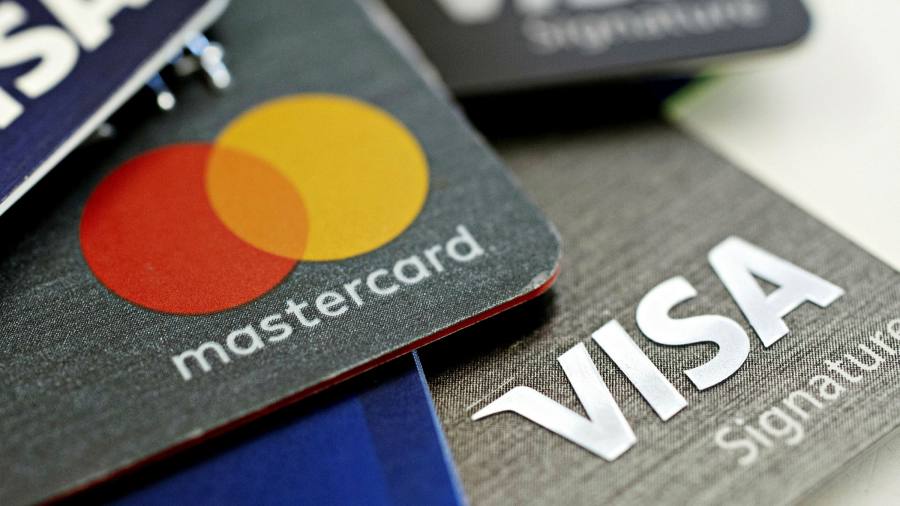[ad_1]
Financial regulation would be different and better after Brexit, promised UK chancellor Rishi Sunak. Sam Woods, who heads the Prudential Regulation Authority, talked of being freed from the “shackles†of Brussels’ rules.
But UK policymakers, and most other supporters of post-Brexit deregulation, probably did not have in mind the quintupling of certain credit card fees when Britons buy goods from the EU.
That is now what is happening when Mastercard debit and credit cards are used — as the Financial Times revealed last week. From October, merchant’s so-called “interchange†fees will jump from 0.3 per cent of the transaction value to 1.5 per cent when someone with a UK credit card buys something from continental Europe. Debit card fees will rise from 0.2 per cent to 1.15 per cent.
Visa has not said whether it would take the same step, merely promising that it would give six months’ notice in the event of any change, though many in the industry expect it to ape its arch rival.
On the one hand, it is hard to blame the credit card companies. The fees were only as low as they have been because of an EU cap, imposed in 2015, which fell away with Brexit.
The “normalised†cross-border charges are specifically permitted under the terms of a Brexit legislative amendment — even though the Payment Systems Regulator, the UK body that has taken on oversight from the European Commission, has kept the 0.2 and 0.3 per cent caps on domestic card transactions.
This looks like blatant profiteering. It is an odd distortion of the concept of Brexit freedoms that liberty is extended to multinational financial institutions, rather than for the benefit of individuals. It is not the kind of transfer of power that you would probably knowingly vote to support.
Admittedly, higher interchange fees do not mean automatically higher costs for British consumers — and do not directly benefit the credit card companies. The fee is actually levied on the European retailer’s bank, which pays it to the bank that issued the customer’s card.
But it would be logical to expect the charges to be passed on to customers, reversing benefits accrued in recent years. A June 2020 report from the European Commission examining the advantages of its interchange fee caps found that retailers — and, thus, potentially their customers — had saved €1.2bn a year.
Even if consumers are not penalised, it is tempting to pity the Spanish chorizo vendor whose already Covid-straitened business may be squeezed harder.
But according to payments specialists, the vast majority of transactions conducted cross-border in this way are actually with multinational groups, such as Amazon, Uber and Apple. These often routed their operations through low-tax EU locations and may now find it more economic to repatriate booking centres to the UK — a surprise Brexit dividend for British tax authorities, perhaps.
What about the bigger picture? Price caps like this are more usual in obviously dysfunctional markets — new UK rules six years ago all but killed off price-gouging payday lenders. The backroom subtlety of interchange fees makes them less of a public cause. But it is worth reflecting on the nature of an industry dominated by a global duopoly that can get away with quintupling a charge from one day to the next.
It is all the more striking because the payments industry has supposedly been at the centre of the financial technology revolution. There has been more fintech innovation in payments than anywhere else. Yet, unlike in other parts of the old financial system, the new competition has not challenged the legacy credit card companies but entrenched them.
The card companies have thrived in large part due to their control of the infrastructure. Some fintechs, such as the UK’s Monzo and Starling Bank, should enjoy windfalls from the higher interchange fees, potentially empowering them to be stronger challengers in future. But it remains a stark reality that few newcomer payments companies outside China can claim to have developed large-scale alternative “rails†on which to route payments.Â
Even amid a rampant stock market, both Visa and Mastercard have excelled. Their share prices are up close to threefold over the past five years (the record-breaking S&P 500 has not even doubled over that period.) No finance company — including big banking groups such as JPMorgan or China’s ICBC — boasts a market value bigger than Visa.
The hike in interchange fees between the UK and Europe might feel like a niche issue but it is a symptom of a deeper malaise.
patrick.jenkins@ft.com
[ad_2]
Source link





